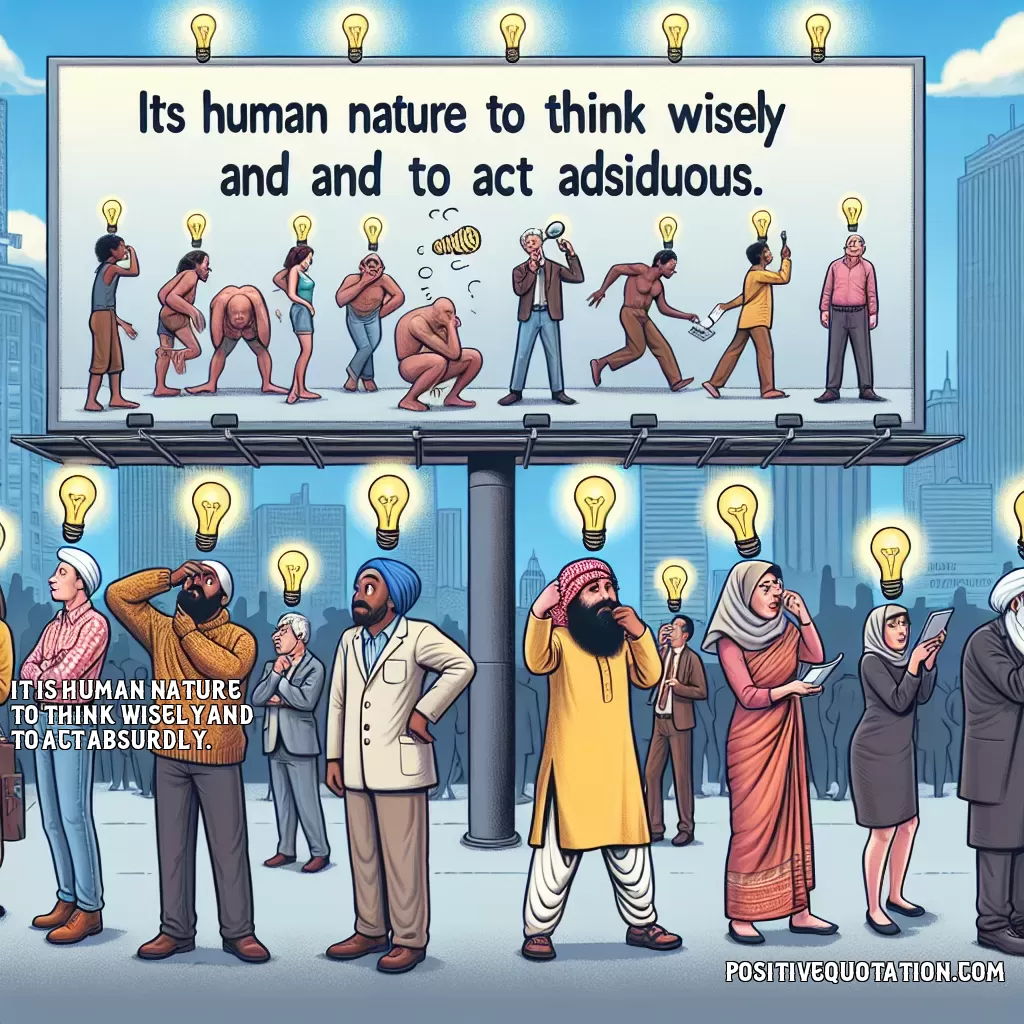
It is human nature to think wisely and to act absurdly.
Author: Anatole France
👁️ 15 views
The quote "It is human nature to think wisely and to act absurdly" suggests a fundamental paradox within the human condition, where our intellectual capacities are often at odds with our behaviors. On one hand, humans are capable of deep thought, introspection, and the philosophical exploration of life's complexities. This ability to think wisely is a testament to our advanced cognitive skills, allowing us to make considered decisions, solve complex problems, and envision long-term consequences. However, despite this capacity for wise thought, humans frequently act in ways that seem irrational or absurd. This could be attributed to a variety of factors, including emotional impulses, societal pressures, or cognitive biases. Emotions can overpower reason, leading individuals to make choices that are not aligned with their well-thought-out intentions. Societal norms and peer pressure can also drive people to act in ways that contradict their inner wisdom, as the desire for acceptance often trumps rational judgment. Moreover, cognitive biases—systematic patterns of deviation from norm or rationality in judgment—can lead to errors in thinking and decision-making. These biases often result in absurd actions that might not align with a person's deeper, wiser understanding. This quote highlights the complexity and duality of human nature. It serves as a reminder of the continuous struggle to align our wise thoughts with our actions, urging us towards greater self-awareness and consistency. Recognizing this paradox can serve as a catalyst for personal growth, encouraging individuals to strive for harmony between their intellectual understanding and their everyday behaviors.
Quote By: Anatole France
Anatole France, born François-Anatole Thibault on April 16, 1844, was a renowned French novelist, critic, and one of the most influential literary figures of the late 19th and early 20th centuries. France grew up in a literary environment; his father owned a bookstore in Paris, immersing him in the world of literature from a young age. After attending the Lycée Louis-le-Grand, he pursued a career in journalism and literature, eventually establishing himself as a prominent author.
Anatole France’s writing is characterized by its wit, irony, and an incisive exploration of the themes of morality and social justice. His first notable work, "Le Crime de Sylvestre Bonnard" (1881), won him critical acclaim and set the tone for a literary career that would be marked by a rich tapestry of novels, essays, and criticisms. The book tells the story of an aging scholar and reflects France's penchant for incorporating elements of his own life experiences into his fiction.
Throughout his career, France wrote several significant works, including "Thaïs" (1890), a novel that delves into spirituality and eroticism, and "The Well of Saint Clare" (1895), which critiques the injustices of society. In 1921, his contributions to literature were recognized when he was awarded the Nobel Prize in Literature, a testament to the enduring impact of his work. His influences extended beyond literature, as he also engaged in political and social commentary, advocating for human rights and criticizing the prevailing attitudes of his time.
Anatole France's style is often described as elegant and sophisticated, filled with a deep understanding of the human condition. His literary legacy continues to resonate, inspiring countless writers and thinkers. France passed away on October 12, 1924, but his works remain a significant part of the literary canon, reflecting his profound insight and artistic mastery. Through his novels, Anatole France not only entertained his readers but also challenged them to reflect on the complexities of life and society.